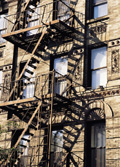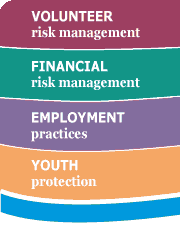Facilities Risk Management:
Understanding Leasing Exposures
 Q: Our nonprofit leases space from other entities for our office and
occasional special events. What exposures do we have because of this?
Q: Our nonprofit leases space from other entities for our office and
occasional special events. What exposures do we have because of this?
A: Leasing relieves you from some obligations and exposures with regards to repair, maintenance and compliance with regulations, however, it's important to know that you still have facility exposures.
Your nonprofit may be liable for injuries or accidents that occur within your rented space, and some, but not all, damages to the space you rent. You may be liable for damage done to another tenant's premises caused by your negligence, such as letting a bathtub or sink overflow. The organization is potentially liable for damage done to the landlord's property by staff, clients, visitors, and vendors. And you may be responsible for an accident or injury suffered by an employee, volunteer, client or visitor to your premises such as a trip and fall incident, or a burn from an auxiliary space heater.
On the other hand, the nonprofit isn't liable for damage due to roof leaks caused by a damaged or poorly maintained roof. It isn't liable for damage caused by hurricanes, tornadoes, floods, mud slides, hailstorms or other "Acts of God." It isn't liable for pipes that freeze and burst because the building's heating system wasn't maintained and repaired by the landlord.
By leasing the nonprofit organization's space, you limit — but don't eliminate — your facilities exposures.
Read Your Lease Agreement
Read your lease agreement to determine your responsibilities. If you don't understand what the lease says, ask your legal counsel or your insurance professional to review the lease with you. Don't sign a lease agreement until you have read and understand what it means for you. This is a legally binding document. Don't be shy. Speak up. Ask questions. Once you've signed the lease, you've agreed to all the terms — whether or not you understand them.
In most instances, the landlord is responsible for complying with all building and health codes. The landlord is responsible for the electrical, plumbing, heating and ventilation systems, and for supplying heat and hot water, and for keeping common areas in the building safe and sanitary. The landlord is responsible for the security for the building, which includes door and window locks, roof access, and lighting.
Your nonprofit may rent additional space for special events, meetings or field trips. Renting space when needed can be an economical way to manage your nonprofit's assets and fulfill its mission. You might rent a bowling alley for an outing, a room at the town library for a board meeting, an historic mansion for a fundraising dinner or a campground for an overnight field trip. No matter what the use, it's always wise to put the agreement in writing (even if — and maybe especially if — the property is owned by a "friend" of the nonprofit). The rental agreement spells out the expectations and responsibilities of both parties and may defuse some disputes before they occur.
Rental Agreement
Rental agreements written by the owner/landlord serve the purpose of protecting the landlord. They are contracts and should be reviewed by the nonprofit's attorney before being signed. Your attorney can advise you whether or not you are getting the deal you discussed and whether you should take additional steps to protect the organization.
A rental agreement should establish, in clear terms, the duties and responsibilities of the owner/landlord and the rental group. The following items should be considered for inclusion in the standard rental agreement, depending on the circumstances:
- Maintenance and Upkeep: While the owner typically remains responsible for any hazardous condition on the property in existence at the time of the lease, the rental agreement can establish who will be responsible for general upkeep such as trash pickup, repairing broken steps, clearing snow and ice, etc.
- Indemnification Clause: The agreement should include a provision holding the owner/landlord harmless for any negligent acts or omissions by the rental group during the term of the lease.
- Instructions on Use of Property and Facilities: The owner/landlord should provide detailed instructions on how its facilities operate or what to do if problems arise.
- Limits on Accessible Areas: If the rental group is only using a portion of the premises, or if certain areas are off-limits, those boundaries should be clearly established in the lease. Then, if a renter strays beyond this area, his status will change from an invitee to a trespasser. Once that occurs, the duty of the landowner is greatly reduced.
- Potential Hazards: Specific warnings about dangerous or hazardous conditions on the premises should be provided.
- Delegation of Supervision: Depending on the situation, the owner/landlord may need to provide its own staff members to assist with supervision. For example, if swimming is available on the premises, additional lifeguards may be required.
- Alcohol Consumption: If alcohol is part of the rental group's activities, it may be necessary to obtain a temporary liquor license. The lease or rental agreement should require the rental group to obtain both the license and, if available, liquor liability insurance, adding the owner/landlord as an additional insured. Finally, the contract should include an acknowledgment by the rental group that no one under the age of 21 will be served alcohol.
To see sample rental agreements, conditions or request forms, consider visiting the following Web sites. You'll note that they offer different benefits and limitations depending on the facility. Your nonprofit's rental agreement will, too, depending on what you require and want.
- Bingo Hall Rental Agreement
- Cultural Center Rental Conditions
- Cultural Center Rental Request
- Renting Newberry Facilities
- Use & Lease by Non-University Groups (University of Minnesota)
The preceding article is an example of the depth of information provided in the final report available through Nonprofit CARES, the Nonprofit Risk Management Center's risk assessment software. The one-time fee of $89 permits you and any other user at your nonprofit to use the program online. Your answers are stored and can be updated as you improve your risk management activities. New reports with detailed recommendations can be printed at any time. If you haven't tried CARES, register online and give it a whirl for free at www.nonprofitcares.org. If you have registered, why not pay the licensing fee to take full advantage of the vast database of knowledge resident in the program. Please contact us at (202) 785-3891 if you have any questions about using CARES or if you would like to discuss the advice contained in the report for your nonprofit. Also, stay tuned for a brand-new book on facilities risk management that will be published by the Center this fall.
We look forward to hearing from you.






